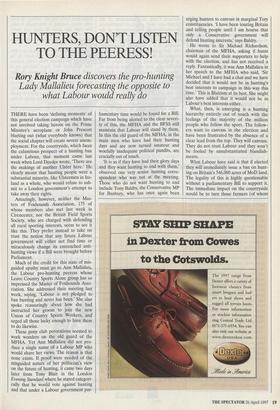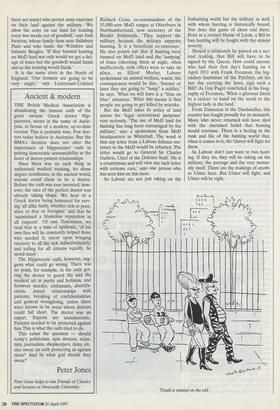HUNTERS, DON'T LISTEN TO THE PEERESS!
Rory Knight Bruce discovers the pro-hunting
Lady Mallalieu forecasting the opposite to what Labour would really do
THERE have been 'defining moments' of this general election campaign which have not involved taking heroin on the Prime Minister's aeroplane or John Prescott blurting out (what everybody knows) that the social chapter will create severe unem- ployment. For the countryside, which faces the calamitous prospect of a hunting ban under Labour, that moment came last week when Lord Deedes wrote, 'There are the makings of another Ulster here.' He clearly meant that hunting people were a substantial minority, like Ulstermen in Ire- land as a whole, who would refuse to sub- mit to a London government's attempt to take away their rights.
Amazingly, however, neither the Mas- ters of Foxhounds Association, 175 of whose members also met last week in Cirencester, nor the British Field Sports Society, who are charged with defending all rural sporting interests, seem to see it like this. They prefer instead to take on trust the notion that any future Labour government will either not find time or miraculously change its entrenched anti- hunting views if a Bill were brought before Parliament.
Much of the credit for this state of mis- guided apathy must go to Ann Mallalieu, the Labour pro-hunting peeress whose Leave Country Sports Alone group has so impressed the Master of Foxhounds Asso- ciation. She addressed their meeting last week, saying, 'Labour is not pledged to ban hunting and never has been.' She also spoke reassuringly about how she had instructed her groom to join the new Union of Country Sports Workers, and urged all those lucky enough to have them to do likewise.
These pony club perorations seemed to work wonders on the old guard of the MFHA. Yet Ann Mallalieu did not pro- duce a single name of a Labour MP who would share her views. The reason is that none exists. If proof were needed of the misguided nature of her politician's view on the future of hunting, it came two days later from Tony Blair in the London Evening Standard where he stated categori- cally that he would vote against hunting and that under a Labour government par- liamentary time would be found for a Bill. Far from being alerted to the clear severi- ty of this, the MFHA and the BFSS still maintain that Labour will stand by them. In this the old guard of the MFHA, in the main men who have had their hunting days and are now turned amateur and woefully inadequate political pundits, are crucially out of touch. `It is as if they have had their glory days and they want hunting to end with them,' observed one very senior hunting corre- spondent who was not at the meeting. Those who do not want hunting to end include Tony Baldry, the Conservative MP for Banbury, who has once again been urging hunters to canvass in marginal Tory constituencies. 'I have been touring Britain and telling people until I am hoarse that only a Conservative government will defend hunting interests,' says Baldry.
He wrote to Sir Michael Richardson, chairman of the MFHA, asking if hunts would again send their supporters to help with the election, and has not received a reply. Fantastically, it was Ann Mallalieu in her speech to the MFHA who said, 'Sir Michael and I have had a chat and we have decided that it would not be in hunting's best interests to campaign in this way this time.' This is Blairism at its best. She might also have added that it would not be in Labour's best interests either.
What, then, is emerging is a hunting hierarchy entirely out of touch with the feelings of the majority of the million people who follow the sport. The follow- ers want to canvass in the election and have been frustrated by the absence of a clear lead from the top. They will canvass. They do not trust Labour and they won't be fooled by unsubstantiated blandish- ments.
What Labour have said is that if elected they will immediately issue a ban on hunt- ing on Britain's 546,000 acres of MoD land. The legality of this is highly questionable without a parliamentary Bill to support it. The immediate impact on the countryside would be to turn those farmers (of whom there are many) who permit army exercises on their land against the military. 'We allow the army on our land for training every two weeks out of goodwill,' says Josh Stratton, whose family farm near Salisbury Plain and who hunts the Wiltshire and Infantry Beagles. 'If they banned hunting on MoD land not only would we get a del- uge of foxes but the goodwill would finish and so the training would finish.'
It is the same story in the North of England. 'Our farmers are going to be very angry,' says Lieutenant-Colonel Richard Cross, ex-commandant of the 53,000-acre MoD ranges at Otterburn in Northumberland, now secretary of the Border foxhounds. 'They support the military because the military supports hunting. It is a beneficial co-existence.' He also points out that if hunting were banned on MoD land and the 'tamping' of foxes (shooting them at night, often ineffectively, with rifles) were to take its place, as Elliott Morley, Labour spokesman on animal welfare, wants, the consequences would be dire. 'Sooner or later they are going to "lamp" a soldier,' he says. 'What we will have is a "blue on blue" situation.' What this means is that people are going to get killed by mistake.
But the MoD takes its policy of land access for 'legal recreational purposes' very seriously. 'The use of MoD land for hunting has long been encouraged by the military,' says a spokesman from MoD headquarters in Whitehall. The word is that any letter from a Labour defence sec- retary to the MoD would be rebutted. The letter would go to General Sir Charles Guthrie, Chief of the Defence Staff. 'He is a countryman and will view any such letter with extreme care,' says one person who has seen him on this issue.
So Labour are not just taking on the foxhunting world but the military as well, with whom hunting is historically bound. Nor does this game of chess end there. Even in a revised House of Lords, a Bill to ban hunting will be fought with the utmost severity.
Should it ultimately be passed on a sec- ond reading, that Bill will have to be signed by the Queen. How could anyone who had their first day's hunting on 4 April 1931 with Frank Freeman, the leg- endary huntsman of the Pytchley, on his last day carrying the horn, sign such a Bill? As Guy Paget concluded in his biog- raphy of Freeman, 'What a glorious finish to a career: to hand on the torch to the highest lady in the land.'
From Damascus to the Dardanelles, this country has fought proudly for its monarch. Many who never returned will have died with the cherished belief that hunting would continue. There is a feeling in the rank and file of the hunting world that, when it comes to it, the Queen will fight for them.
So Labour don't just want to ban hunt- ing. If they do, they will be taking on the military, the peerage and the very monar- chy itself. There are the makings of anoth- er Ulster here. But Ulster will fight, and Ulster will be right.
`Youth is wasted on the old.'



































































 Previous page
Previous page